Festivities cut short
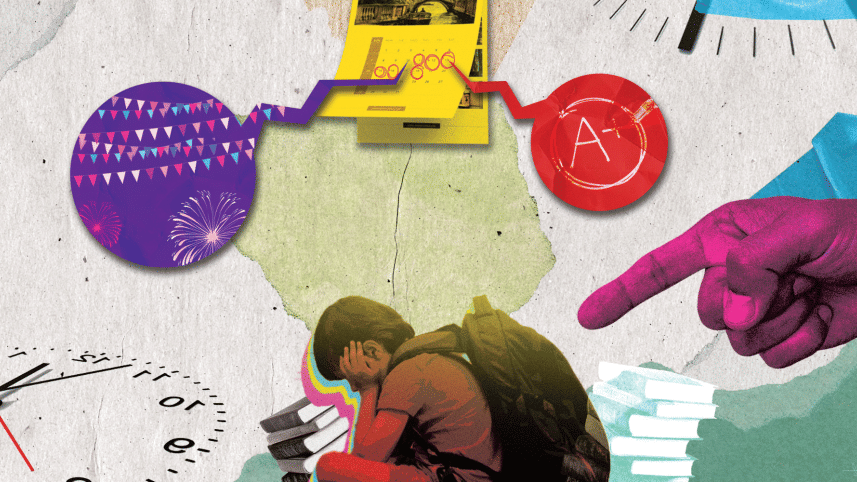
Holidays during one's festivities is something which is often taken for granted by people. Afterall, it is a time when people gather together to engage in their respective communities and celebrate their long-awaited festivities with their friends and families. However, it is often far from reality for a lot of people, and so I set out to find out how different religious and indigenous groups are deprived from holidays during their festivities.
For 15-year-old Rupantee Saha*, a ninth-grade student studying at Monipur High School and College, holidays are not available for a lot of her religious festivities. While she does receive holidays on the occasion of Durga Puja, a lot of other religious festivities, which are celebrated by her family, require her to take a leave from school.
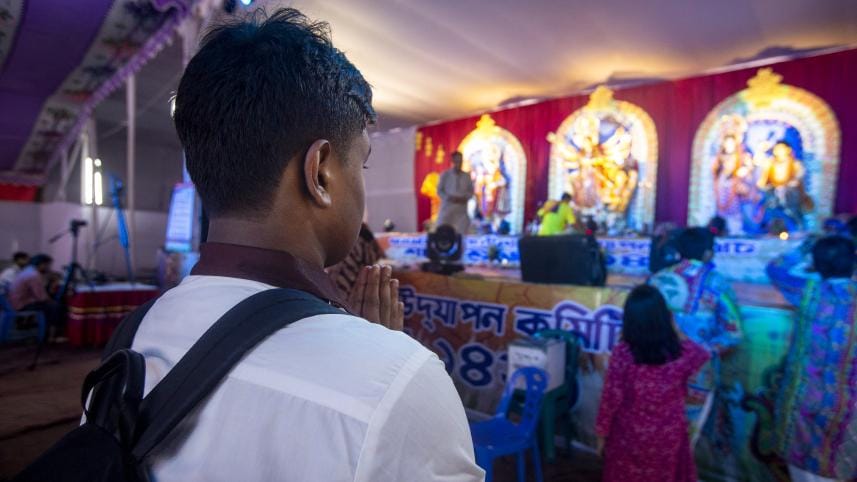
However, taking leave from her school is not an easy process as she has to pay a hefty fine if she is absent for more than three days in a month.
"Given that I have to pay an amount of 1600 taka – which is equivalent to my fees for a month – if I am absent for more than three days, I am often unable to visit my village during some of the lesser known religious festivities. Even if we do submit a formal application, the fees often do not get waived because of hostility and a lack of cooperation from the authorities," explained Rupantee.
Rupantee's predicament is one that is shared by many others. 25-year-old Adrijeet Deb firmly recalled how his public university admission exams had largely overlapped with the Puja and Diwali season.
"Such public university admission exams are a big opportunity for students. As I had to study during the festive season, I had to miss out on a lot of the celebrations which was very frustrating for me. When you are working hard all around the year, you tend to look forward to these festivities to enjoy with your family and friends. Instead, being pushed into the burden of studying and not being able to enjoy these festivities is pathetic," he said.
Adrijeet also talked about how his father, who was a doctor, only received sectional holidays on three days in a one-year period – only one day during Durga Puja, one day during Diwali and one day during Saraswati Puja. This meant that he could spend very little time with his family during the festive seasons.
Adrijeet's sister also had to face this while working as an intern at Chittagong Medical College Hospital, "My sister was not very fond of it and neither was her husband and their family, since they had to wait to go out with her after her shift ended."
According to him, she also had to actively work during the two Eid holidays, which were three days long each, and it was extremely daunting as the hospitals during Eid are excruciatingly understaffed.
While Adrijeet did receive his fair share of holidays as he worked in the private sector and adequate sectional holidays were guaranteed as a part of his contract with his company, a lot of other people are not so lucky.
For Christina Joyeeta Munshi – who is currently working as a Junior Analyst at a private policy research organisation and is a follower of the Christian faith – the experience of asking for leave at a privately-owned working place has been largely disappointing.

Remembering a particular incident, Christina explained, "When I worked as a sub-editor for an online news media company, they asked me to volunteer for a news report on December 24, which is Christmas Eve, although I had already taken a leave on that day. Then, they again asked me to join the office on December 26 for a special interview, again on the day I already had taken leave to celebrate Christmas."
According to Christina, "Celebrating Christmas is a lucrative and enriched process, with multiple aspects, such as decorating the church or your own house, sitting with family and making a wide range of cakes and pithas, arranging gifts for close ones and meeting your friends and families. So, when you only get a one-day holiday for such a major festival, it eventually makes you miss the whole vibe of such a long-awaited event which is celebrated with family and friends of my community."
While religious communities are often deprived of holidays during their festivities, indigenous communities also face a similar issue. For 23-year-old Anton Chakma, a student at the Department of Japanese Studies of Dhaka University, celebrating Biju – the most important cultural festival of the Chakma community – with his family seems like a distant dream.
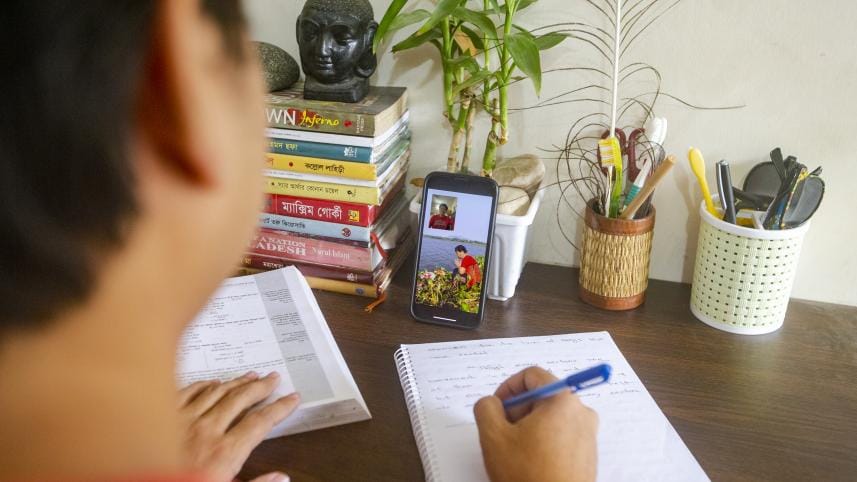
While he did not have exams during the Biju celebrations this year, he did see a lot of his indigenous juniors not being able to celebrate the festival as they had exams during that week. He narrated how one of his juniors had called him on the day before Biju and said, "Dada, I won't be able to go back to my home this time. Are you going?"
Seeing his fellow indigenous students not being able to attend their festivities demoralised Anton as indigenous students in the university are a tight-knit community. He decided not to go back home and celebrate Biju with his family and friends. As a result, Anton, like many of his indigenous friends, had to miss out on the various religious and social aspects of the Biju festival, such as performing religious rites with members of their family – an experience which they look forward to every year.
Anton further noted that, "This issue is not only prevalent in universities, but indigenous students in schools and colleges, including my own sister, have to face such difficulties as they often have to take classes or exams during the Biju festivities."
Anton's remarks about the issues faced by indigenous students in schools were also reiterated by May*, a 17-year-old student studying at an English Medium school in Dhaka. As a Rakhine descent and a practising Buddhist, she celebrates three festivals across the year – Sangrai, Buddha Purnima and Probarona Purnima.
However, she only receives a one-day holiday for Buddha Purnima and Sangrai and no holidays for Probarona Purnima, despite the fact that both the Rakhine Water Festival and Probarona Purnima are celebrated for about a week by members of the Rakhine community in her hometown of Cox's Bazar.
"In my hometown, the festivities can last for about a week, which is much grander and more beautiful. This is something which we obviously miss out on due to our limitations. I grew up hearing from my parents about how joyful these events were and how the entire village would have this air of excitement and enthusiasm while preparing for these festivals – an experience which is definitely missing here in the city," explained May.
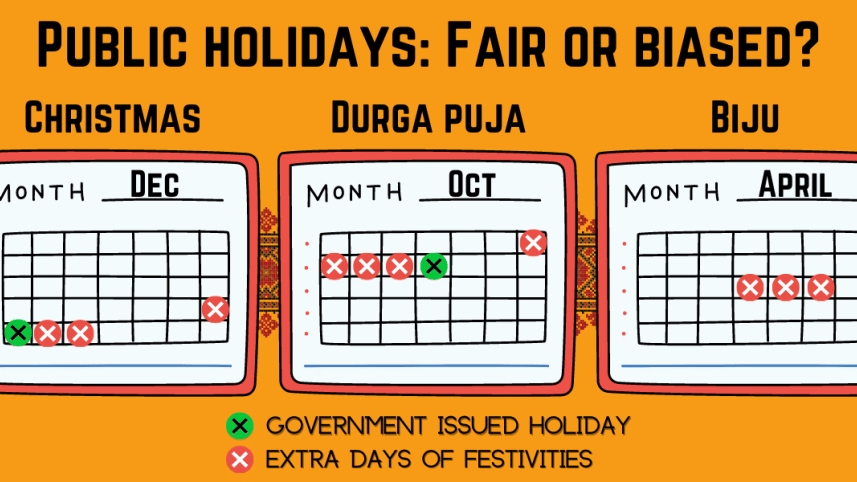
According to May, being unable to go to her hometown and celebrate these festivals with her community due to a lack of holidays is causing her to grow up with a disconnect in her identity, which she finds a bit dangerous.
"I am still not well acquainted with our rituals, their symbolism and their connection to ancient folklore or the life of Buddha, because we do not get to discuss these things very often, as opposed to people who are exposed to their culture while growing up," said May.
The festivals which are celebrated by these indigenous and religious groups are often a core part of their identity, as these festivals are a gateway for them to connect to their respective communities. Not giving them adequate holidays to celebrate their festivals is a tacit manner of not acknowledging their identities and thus not very reflective of the diversity we have in our country – a sentiment which was echoed by both Anton and Christina.
Therefore, granting equal privileges to the country's minorities has to go way beyond having a chapter on the country's diversity in the NCTB Bangla book. This can rather be started from providing them with holidays during their festivals – a practice which will surely make them feel much more connected to their roots, while at the same time making them feel more welcome in wider social and professional circles.
*Names have been changed on request
Hrishik is probably going to attend office during his holidays. Convince him not to at hrdibbo@gmail.com

 For all latest news, follow The Daily Star's Google News channel.
For all latest news, follow The Daily Star's Google News channel. 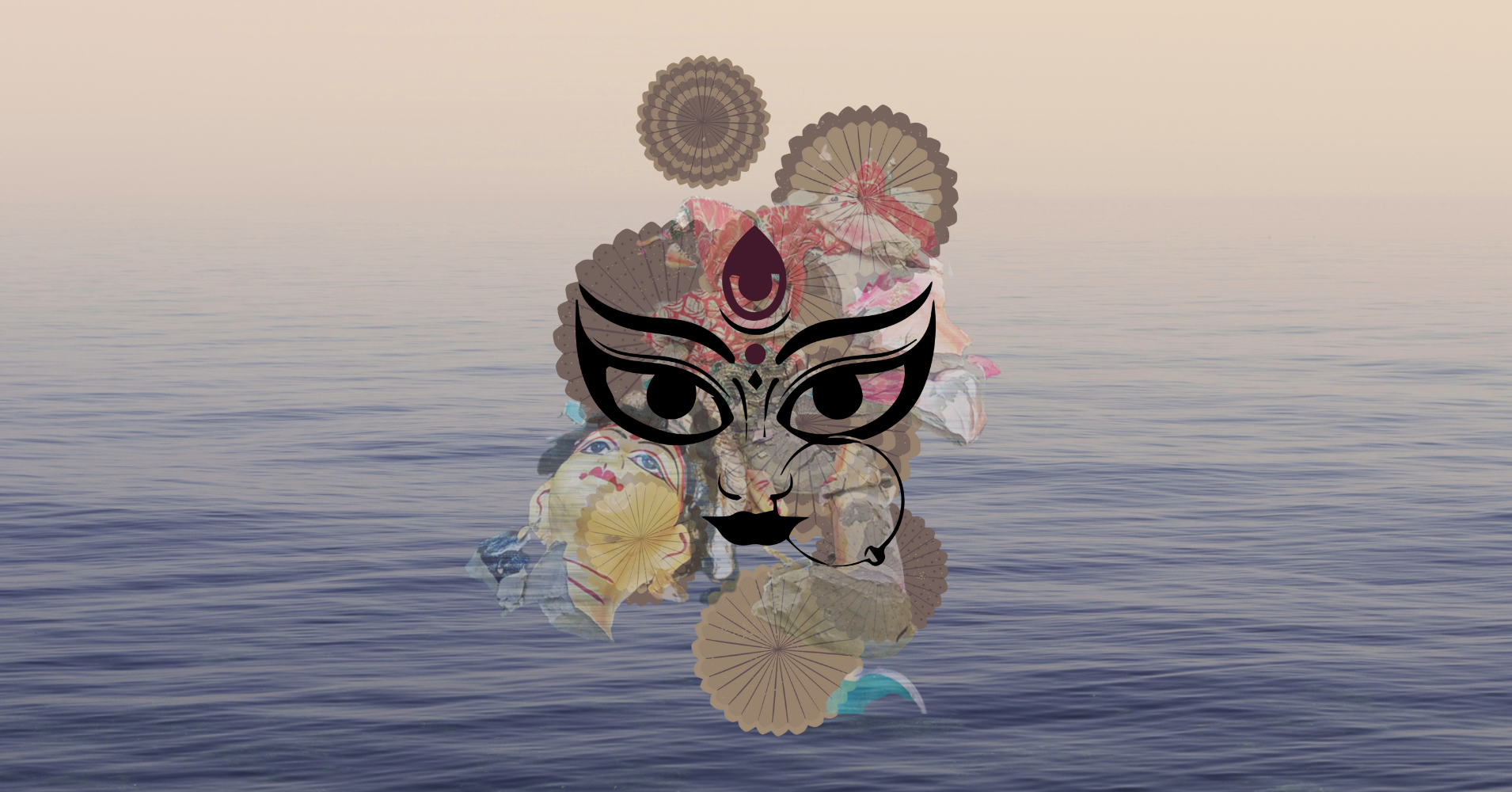
Comments